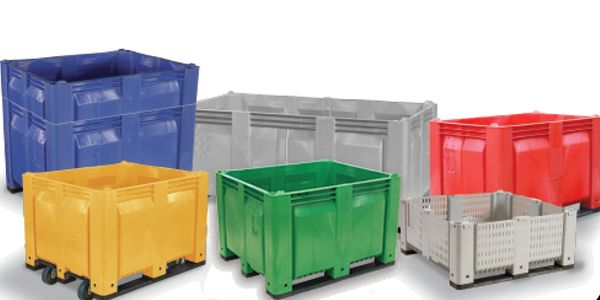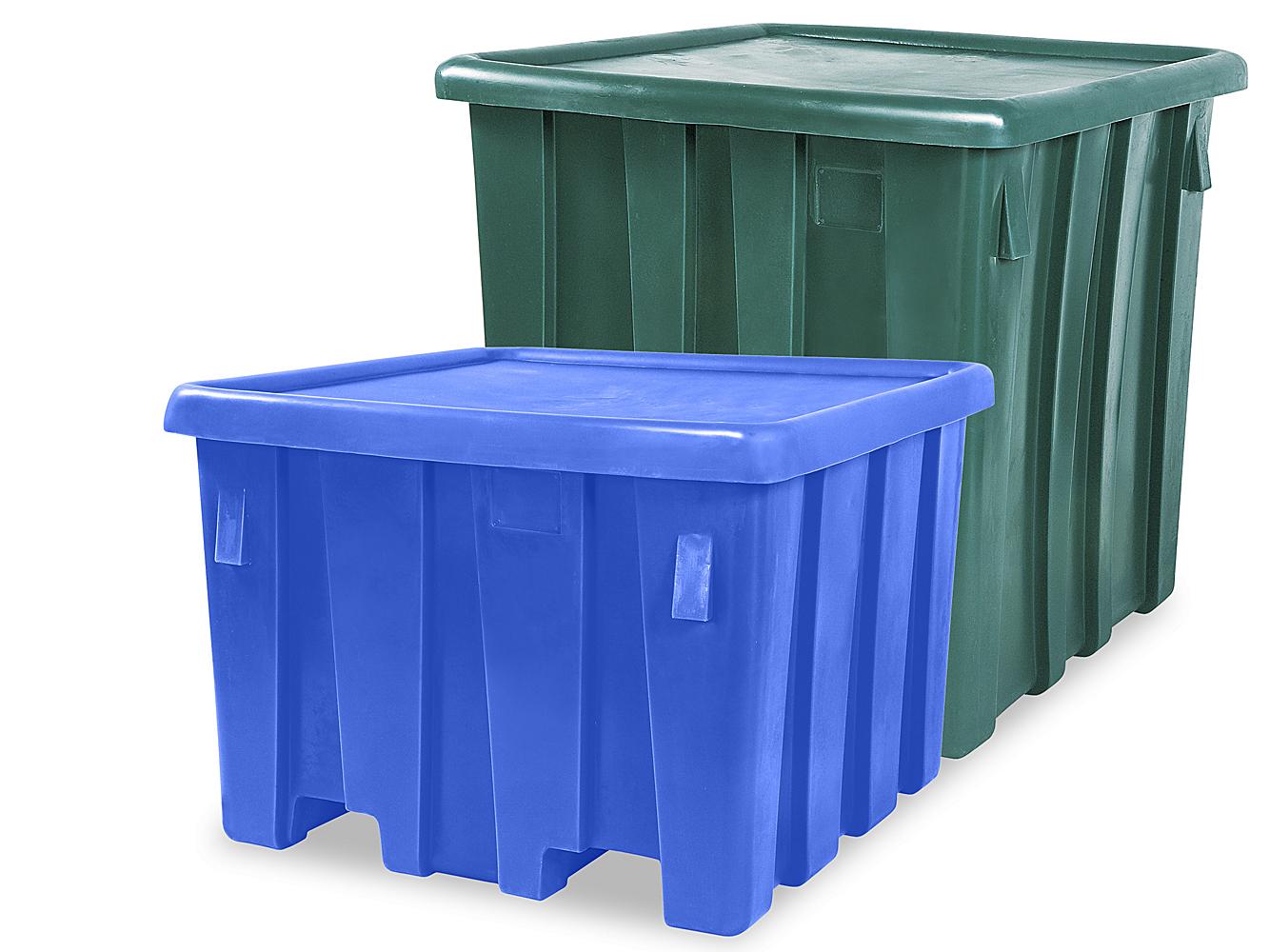Find out how plastic bulk containers can save time for your operations
Wiki Article
The Role of Mass Plastic Containers in Effective Recycling Practices and Sustainability
Bulk plastic containers are essential to modern-day recycling initiatives. Their layout boosts the performance of material collection and transport, adding to sustainability objectives. These containers not only maximize area however additionally aid in keeping an eye on contamination degrees. However, their application is not without challenges. Understanding the complete range of their effect reveals a complex connection in between logistics and ecological duty that calls for further expedition.Comprehending Mass Plastic Containers
Bulk plastic containers offer as a necessary component in numerous industries, promoting the storage space and transportation of goods. These containers are usually made from robust products such as high-density polyethylene (HDPE) or polypropylene, which offer longevity and resistance to ecological elements. Their design commonly includes features like stackability and modularity, permitting reliable use room throughout both storage space and transit.Industries such as farming, food processing, and making often utilize mass plastic containers because of their light-weight nature and simplicity of handling. The containers come in various sizes and setups, satisfying the certain requirements of different items. Their versatility expands past mere capability; they can additionally be personalized with lids, deals with, and identifying choices to improve usability - Bulk Plastic Containers. Because of this, bulk plastic containers play an important role in maximizing logistics and supply chain procedures across numerous fields, thereby adding to general performance and cost-effectiveness
Benefits of Utilizing Bulk Plastic Containers in Recycling
The usage of bulk plastic containers substantially improves the effectiveness of the process when companies prioritize recycling initiatives. These containers are made to enhance room, enabling for the storage space and transport of larger quantities of recyclable products. This results in less journeys to recycling facilities, consequently decreasing fuel intake and connected emissions.Additionally, mass plastic containers are resilient and immune to various environmental factors, making certain that products remain protected throughout handling and transit. Their light-weight style additionally adds to reduce transportation costs.
The harmony of these containers helps with better sorting and processing of recyclable materials, which can boost general recycling prices. Organizations that take on bulk plastic containers additionally show a dedication to sustainability, positively affecting their brand name image. Ultimately, these advantages not just improve reusing techniques however likewise add to more comprehensive environmental objectives
Exactly How Bulk Plastic Containers Facilitate Product Collection
Efficient material collection is considerably enhanced by the usage of mass plastic containers, as they give a organized and effective solution for collecting recyclable products. These containers are designed to accommodate big quantities of products, which streamlines the sorting and storage procedure. Their stackable design makes best use of space usage, making it less complicated for centers to organize recyclables without clutter.Additionally, mass plastic containers are durable and weather-resistant, enabling for exterior positioning without degradation. This strength assures that materials remain secured till they are accumulated for processing.

The harmony in shapes and size of these containers assists in standardization throughout collection factors, making it possible for better monitoring of recyclable quantities. Their clear nature enables for easy presence of materials, aiding in the monitoring of contamination levels and guaranteeing that only ideal materials are collected. In general, bulk plastic containers play a vital role in enhancing the material collection procedure, consequently promoting reliable recycling techniques.
Transportation Efficiency and Environmental Impact
Transport efficiency plays an essential duty in the reusing procedure, specifically with the optimization of load ability wholesale plastic containers. By taking full advantage of the quantity of material transported, business can greatly decrease the variety of trips required, thereby reducing their carbon impact. This technique not only boosts functional effectiveness however also adds to much more lasting environmental techniques.
Enhancing Tons Capacity
Maximizing lots capacity is often overlooked, it plays an essential duty in enhancing transport efficiency and lessening environmental influence in recycling techniques. By maximizing the quantity that bulk plastic containers can hold, recycling operations can minimize the variety of journeys required for transportation. This not only decreases gas intake but also reduces the wear and tear on lorries. Effective load management enables facilities to utilize area effectively, making sure that each transport cycle is as efficient as feasible. Additionally, well-optimized tons can bring about better settlements with logistics suppliers, possibly minimizing total prices. Eventually, improving lots capability contributes to a more lasting recycling system by fostering effective resource use and lessening waste created throughout transport.Lowering Carbon Impact
As reusing operations undertaking to minimize their ecological influence, decreasing the carbon footprint linked with transport becomes a crucial objective. Bulk plastic containers play a critical duty in attaining this objective by improving tons effectiveness and maximizing logistics. Their light-weight yet long lasting design allows for maximum cargo space usage, lowering the variety of journeys needed to move products. By combining shipments, recycling centers can lower gas usage and greenhouse gas emissions. On top of that, tactically situating recycling centers decreases transport distances, in addition lowering carbon outputs. Employing fuel-efficient cars and alternate power resources boosts general sustainability. By integrating these methods, the reusing sector can appreciably reduce its carbon footprint, contributing to a much more sustainable future.Challenges in the Use of Bulk Plastic Containers

Contamination Problems
Contamination problems represent a substantial difficulty in the effective use bulk plastic containers within recycling methods. These containers usually build up deposits from previous materials, causing mixed materials that can impede the reusing procedure. Impurities such as food waste, chemicals, or non-recyclable products can endanger the stability of the whole set, leading to increased disposal prices and lowered recycling prices. Furthermore, improper cleansing or sorting can aggravate these concerns, making it difficult for recycling centers to refine products efficiently. The presence of pollutants not just impacts the top quality of recycled products yet additionally undermines the total sustainability efforts focused on minimizing plastic waste. Resolving these contamination difficulties is vital for enhancing the effectiveness of mass plastic container recycling.Recycling Infrastructure Limitations
Inefficiency in recycling framework postures substantial obstacles for the effective monitoring of mass plastic containers. Several reusing facilities lack the capacity to refine large volumes of these containers successfully, causing boosted expenses and hold-ups. Furthermore, inadequate sorting innovations often bring about contamination, as mass containers might be blended with other products, making complex the reusing procedure. Minimal transport choices additionally hinder the motion of bulk plastic containers to appropriate recycling centers, resulting in increased garbage dump waste. Furthermore, a lack of standard protocols for bulk container recycling creates complication amongst organizations and customers, even more making complex efforts to promote sustainability. Addressing these facilities constraints is necessary to enhance reusing methods and optimize the potential of mass plastic containers in a circular economic situation.Best Practices for Implementing Bulk Plastic Containers
When organizations think about executing bulk plastic containers in their reusing methods, they ought to focus on a critical technique that improves efficiency and lowers contamination dangers. Selecting the proper container size and type is necessary to accommodate the volume of materials being processed. Organizations ought to additionally develop clear labeling and signs to guide customers on correct disposal methods, minimizing complication and mistakes. Normal training sessions for team can better enhance these techniques, guaranteeing everybody understands their functions in keeping reusing integrity.
Furthermore, companies must apply a regular upkeep timetable to evaluate and clean containers, stopping the build-up of contaminants. Partnering with local recycling facilities can likewise enhance the collection procedure, making certain that products are properly refined. Companies should keep track of and examine their recycling metrics, utilizing this information to refine techniques over time and promote continuous enhancement in their sustainability initiatives.
The Future of Mass Plastic Containers in Lasting Practices
As companies progressively prioritize sustainability, the duty of bulk plastic containers in reusing practices is readied to develop substantially. Technologies in materials scientific research are causing the growth of recyclable and naturally degradable alternatives, boosting the ecological benefits of bulk plastic containers. In enhancement, the execution of closed-loop systems will permit easier collection and repurposing of these containers, minimizing waste and resource intake.Technical developments, such as smart radar, will certainly make it possible for business to keep track of the lifecycle of mass containers, enhancing go to this site performance in recycling procedures. As customer demand for sustainable methods grows, services will likely take on mass plastic containers developed for reuse and long-lasting worth. Cooperation between industries and governments will certainly cultivate the facility of standard reusing methods, guaranteeing that mass containers are properly integrated right into broader sustainability efforts. On the whole, the future of mass plastic containers shows up encouraging, with substantial possibility for adding to a round economy.
Frequently Asked Concerns
How Are Mass Plastic Containers Made and What Materials Are Used?
Bulk plastic containers are normally made from high-density polyethylene (HDPE) or polypropylene (PP) These products are processed via injection molding or strike molding methods, leading to resilient, lightweight containers ideal for various storage space and transport requirements.
Can Mass Plastic Containers Be Recycled Several Times Before Recycling?
Yes, bulk plastic containers can be reused numerous times before recycling. Their resilience and style permit duplicated use in different applications, advertising sustainability and source effectiveness while decreasing the requirement for new containers.
What Accreditations Exist for Bulk Plastic Containers in Recycling?
Various certifications for mass plastic containers consist of the Recycling Partnership's certification, the Cradle to Cradle Qualified ™ criterion, and the Lasting Packaging Coalition's standards, guaranteeing containers fulfill certain environmental and recyclability standards for efficient recycling.Just How Do Bulk Plastic Containers Contrast to Other Recycling Storage Space Options?
Mass plastic containers offer better toughness and capability compared to other recycling storage space alternatives, lowering the risk of contamination and promoting effective transportation. Their style sustains better company, enhancing general effectiveness in recycling procedures.What Is the Life expectancy of a Bulk Plastic Container in Recycling Processes?
The life-span of a bulk plastic container in reusing processes typically varies from 5 to 10 years, relying on usage, worldly quality, and ecological conditions, permitting several cycles of usage before eventual disposal or recycling.When organizations prioritize recycling efforts, the use of mass plastic containers significantly improves the performance of the procedure. Transport performance plays a necessary role in the recycling process, particularly through the optimization of load capacity in bulk plastic containers. The use of bulk plastic containers in reusing techniques faces significant obstacles, particularly concerning contamination problems and limitations within reusing facilities. Contamination problems represent a substantial obstacle in the reliable usage of mass plastic containers within reusing practices. When companies think about carrying out mass plastic containers pop over to these guys in their reusing techniques, they need to focus on a strategic method that enhances efficiency and decreases contamination risks.
Report this wiki page